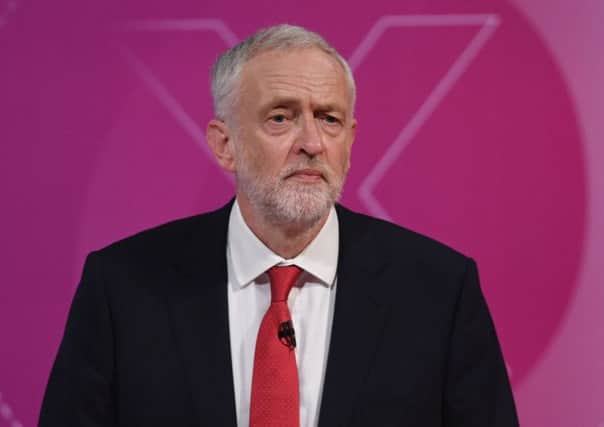Corbyn struggles with nuclear question, May defends election call in York TV debate


The Prime Minister rejected the suggestion her decision to go to the polls, having previously insisted there would not be an early election, was solely in the interests of the Conservative Party.
But it was who Labour leader Jeremy Corbyn suffered the most uncomfortable moments of the event as he struggled to answer questions over his opposition to nuclear weapons.
Advertisement
Hide AdAdvertisement
Hide AdMrs May maintained she was not now regretting calling election in the face of a narrowing lead over Labour in the polls.
She said: “It would have been the easiest thing in the world for me having become the Prime MInister after the referendum when David Cameron resigned to say the next election is not until 2020.”
She continued: “I could have stayed on doing that job for another couple of years and not called an election.
“I had the balls to call an election.”
Mrs May faced hostile questions over her plans for elderly care, dubbed the dementia tax, and her failure to put a figure on the cap on social care costs she promised after consternation in Conservative ranks over the policy as it was set out in the manifesto.
Advertisement
Hide AdAdvertisement
Hide AdThe Prime Minister said it was important to consult with organisations involved in elderly care to make sure it is set at the “right level”.
Asked by an NHS worker about the current one per cent limit on annual public sector pay rises, the Prime Minister responded: “We have had to take hard choices across the public sector in relation to public sector pay restraint.”
She said: “I’m being honest with you in terms of saying we will put extra money into the NHS but there isn’t a magic money tree that we can shake that suddenly provides for everthing that people want.”
Mrs May told the audience her presence at the BBC Question Time Special, broadcast from York University, showed she was not avoiding debates.
Advertisement
Hide AdAdvertisement
Hide AdBut Labour leader Jeremy Corbyn criticised her refusal to debate with him directly.
Mr Corbyn was pressed by the audience over whether he would pursue a coalition deal with the SNP in the event of a hung parliament and the Labour leader insisted there would be “no deals”.
Quizzed by a businessman about Labour’s plans to raise corporation tax, he said: “Yes we are asking the very biggest corporations to pay a bit more but I tell you what, I think it’s worth it.
“It’s worth it so any young person can go to university and not leave with debt, it’s worth it to make sure school headteachers don’t have to collect at the school gate to pay the teachers’ salaries.
Advertisement
Hide AdAdvertisement
Hide Ad“I think it’s worth it for a better society in which everyone can achieve something.”
The Labour leader was challenged over his party’s track record on anti-semitism under his leadership.
“I deplore racism in any form whatsoever,” he said.
Mr Corbyn looked uncomfortable as he was repeatedly asked if there were any circumstances in which, as Prime Minister, he would launch nuclear weapons such as the UK coming under attack. “Any circumstances where anyone is prepared to use nuclear weapon is disastrous for the whole planet,” Mr Corbyn said.